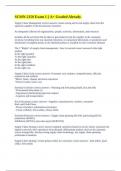SCMN-2150 Exam 1 || A+ Graded Already.
Supply Chain Management correct answers creates strong end to end supply chain from the
upstream supplier to the downstream consumer.
An integrated collected of organizations, people, activities, information, and resources
Includes all the activities that its takes to get products from the supplier to the consumer,
involves everything from raw material extraction, to component fabrication, to production and
distribution of tangible goods, so the finished product is available to meet consumer demand
The 7 "Rights" of supply chain management - how to succeed correct answers In the right
product
In the right quantity
To the right customer
At the right time
At the right place
In the right condition
At the right cost
Supply Chain Goals correct answers *Customer care, industry competitiveness, efficient,
responsive and resilient
*Better, faster, cheaper and more responsive
*Drive revenue, lower cost
Essential Activities correct answers - Planning and forecasting (build, buy and sell)
- Procurement (buy/make it)
- Operations (transforming input into output)
- Logistics and transportation
Key Participants correct answers - Suppliers, manufacturers, retailers, customers
Back and Forth Flows
- Flows of product, information and money
- Create visibility, drive utility, release funds
Essential Processes correct answers - Supply chain planning (PLAN), purchasing (BUY),
production (MAKE),
fulfillment (MOVE), post sales report (SERVICE)
Supply Chain Strategy correct answers segment customers based on service needs, customize the
logistics network, drive operations from demand, differentiate product closer to the customer,
source strategically, develop strong supply-chain technology, use supply chain spanning
performance measures
Supply Chain Strategy: Create greater utility for customers correct answers - time utility, place
utility, form utility
, - Creates high customer expectations
Pursue cross-chain alignment correct answers simple system to a fully synchronized system
M2- Supply Chain Network Design correct answers Network design influences ability to meet
demand, capacity you have, costs of customer service, and kind of service you give
Nodes: correct answers fixed points in a supply chain where goods are processed, mixed, held, or
sold
Links: correct answers the transportation method used to connect the nodes in the supply chain
- Trucks, trains, ocean ships, airplanes, pipelines
- Intermodal transportation: 2 or more modes are used
Geographic scopes & number of nodes: Decision factors correct answers product value, weight
and dimensions, demand, shelf life
Geographic scopes & number of nodes: Centralized (efficiency) correct answers - Control:
decision making, authority at a single node in supply chain
- Benefits: lower inventory & safety stock levels, single location creates
better visibility, lower overhead stock, less labor, smaller management
team, economies of scale
- Challenge: longer lead times, higher delivery costs, potential inefficiencies
as single facility grows, potential issues w/ regional customers
Geographic scopes & number of nodes:Decentralized (effectiveness) correct answers multiple
factories & distribution centers that serve
a particular market
- Move shorter distances to stores, less money spent on transportation
- Control: customer interaction, flow of goods, local decision making
authority
- Benefits: customer proximity which creates shorter lead times, lower
delivery costs, and more responsiveness to demand
- Challenges: more safety stock in the system, higher overhead costs b/c of
more managers and no economies of scale
- Risk: lack of control and coordination
Centralized vs decentralized correct answers Inventory costs: lower for centralized, higher for
decentralized
- Facility costs: lower for centralized, higher for decentralized
- Transportation: cheaper inbound for centralized, cheaper outbound for
decentralized
- Service level: worse for centralized, better for decentralized
- Direct delivery: correct answers products moved from facility to customer
- Eliminates the need for intermediate facilities, reduces delivery delays, cuts product loss




